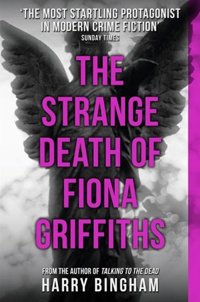Harry Bingham first introduced Fiona Griffiths to us in his excellent debut novel Talking To The Dead in 2012 and we met her again the following year in Love Story, With Murders. She is a bright and feisty detective constable from Cardiff, but she’s a DC with a difference. Fiona has Cotard’s Syndrome, a rare psychosis with many variants. She spent her early years hospitalised in various mental institutions but survived to go to university and then become a police officer, despite her adoptive father being a big name Cardiff criminal.
One symptom of Fiona’s condition is that she doesn’t understand the nuances and complexities human conversation and interaction. She is smart enough to have learned correct responses for most situations, but what she says is often in direct contrast to what she is actually thinking. Mental disorder? Perhaps, but it is one that sometimes puts Fi Griffiths several steps ahead of her saner colleagues. “These days, I’m largely OK with my own craziness. I accept it, the way the lame accept their limp, the way the deaf their world of silence,” she says at one point.
Having survived brushes with some very dangerous people in the earlier books, Fi has taken a training course for undercover operations and has passed with flying colours. Now she’s been asked to take on a whole new identity – that of a troubled wages clerk called Fiona Grey. She is to be embedded in a series of bona fide firms in the hope that she will attract the attention of – and be recruited by – a team of expert fraudsters who are planning an online wages heist. It could constitute one of the biggest thefts in criminal history. Fiona Grey’s identity is elaborately constructed to include both an abusive Manchester boyfriend, and her own charges for violent assault.
The crooks take the bait and the more Fiona becomes enmeshed with the criminals the more she realises that she is part of an international financial conspiracy, but to the people she’s working for she is a disposable asset. To her dismay, she also comes to understand that the fraudsters are probably more sophisticated and ingenious than the officers from the Serious Organised Crime Agency, who are meant to be protecting her. She becomes more involved with the crime gang’s head of security than she might have wished, but her genuine dislocation from her own identity allows her to get right to the heart of the conspiracy. As events spiral towards a violent conclusion, the question is can SOCA stay close enough to keep her from harm?
Aside from the clever plot, and the mesmerising main character, Bingham’s style of prose deserves mention. It’s rapid fire, and pulls you along with strings of three-, four- or five-word sentences. To create a character who is sexy, funny, vulnerable, slightly unhinged yet totally credible is a feat that most novelists would never even attempt. Bingham not only tries, but succeeds. This writing is brilliant, and it hits spots that other crime fiction simply doesn’t.
In terms of physical action, Fiona Griffiths gets involved where angels would fear to tread. As in the two previous books the going gets extremely tough for her, and in the hands of a lesser writer some of the scenes might border on the implausible. Bingham, however, is good enough to keep us on board. Romance for Fiona – like much else in her life – is never easy, and there is a poignant twist at the end of the book which will melt the hardest of hearts.
And the title? To say too much would be a giveaway. In one sense it is perfectly apt, but you’ll have to read the book to take in its full meaning. You can read last year’s interview with Harry Bingham here.
Orion
Print/Kindle/iBook
£4.35
CFL Rating: 5 Stars










